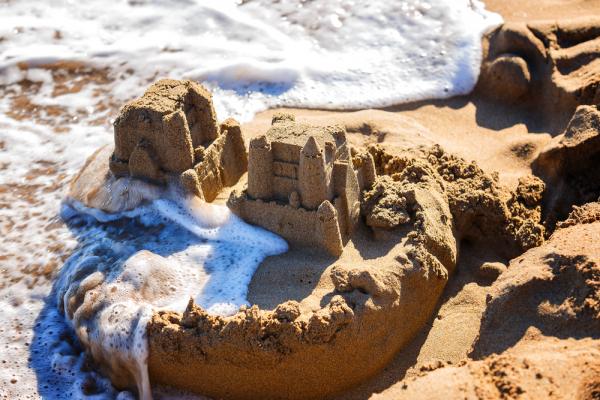“Above the Lord were seraphim, each with six wings: With two wings they covered their faces, with two they covered their feet, and with two they were flying. And they were calling to one another: ‘Holy, holy, holy is the Lord Almighty; the whole earth is full of his glory.’
At the sound of their voices the doorposts and thresholds shook and the temple was filled with smoke. ‘Woe to me!’ I cried. ‘I am ruined! For I am a man of unclean lips, and I live among a people of unclean lips, and my eyes have seen the King,the Lord Almighty.’” —Isaiah 6:1-5
Love came to me in the form of an easygoing, Republican-voting, former military, pickup-driving man to balance out my type A, left-leaning, theologically moderate, never-lived-outside-of-a-city self. It arrived like an ocean wave, crashing into the shore and washing away the castle I had been painstakingly carving out of the sand.
Like that sandy symbol of my supposed sovereignty, for the past 17 years of my adult life, my calendar, my time, and my money, have been shaped through being single and childless. Although there have been many times when I lamented my familial status, I didn’t really mind that I could do what I wanted, when I wanted to, and with whomever I chose. I could imagine the type of man I’d fall in love with, where we’d live, and what our life together could be like, without any interference from reality.
In the past nine months I’ve watched with horror and frustration as those sandy palace rooms and courts have been overtaken. My calendar, my time, my money, my plans have all experienced this love’s disruption.
But that’s not all that’s been washed away. If I had any lingering doubts that “there is no one on Earth who is righteous, no one who does what is right and never sins,” those were dispelled the first time I found myself arguing with this beloved. The masks I could carve so well out of the sand are worthless clumps now under this man’s gaze. There’s a reason why the Beloved in Ecclesiastes charges her friends not to “arouse or awaken love until it so desires.” In so many ways, this love’s arrival has been my undoing.
When Love comes, it makes room for itself. It knocks down walls. It pushes up against ancient boundary stones. It levels the high and lofty places. It pulls up the low-lying ground. It grinds up against the rough and crooked places and makes them both smooth and straight. It disrupts the world as you know it.
“Love,” as a guy from Nazareth has said, “hurts.”
When we talk about the Advent season, we use the language of longing. We talk about hopeful expectation, of light flooding the darkness. As a single woman, I grew to love Advent for these reasons. They reframed what for years had been the least wonderful time of the year. The weeks between Thanksgiving and New Year’s were filled with reminders of all that I lacked — a husband, children, family of my own. Advent became the reminder that it is into those very empty places that Jesus — Love Incarnate — comes to fill and heal with himself.
But rarely do we speak about the seeming chaos and glorious disruption that follows when this holy Love arrives. After all, Lenten repentance follows very shortly after the hopeful expectancy of Advent and the rejoicing of Christmas. When Love Incarnate comes, it starts the hard process of making room for itself. Centuries before this living, breathing Love came into the world, the prophet Isaiah described an encounter he had with the Living God. Seeing God in the fullness of divinity undid him and changed his life. Months before Jesus’ birth, Mary and her betrothed Joseph have divine encounters which disrupts their lives — and history — forever. Years after this child’s birth, a woman with a checkered past goes to draw water from a well and meets a man who would tell her everything she ever did. Yes, this Love came first as a little baby — but his coming forever altered the lives of those who would encounter him.
When this little-baby-turned-God-man from Nazareth said, “Whoever wants to save their life will lose it, but whoever loses their life for me and for the gospel will save it,” he was saying “Love hurts.” For some disciples, these words have meant literal death, suffering, pain. For others it has meant the death to plans, dreams, hopes, and expectations.
And yet this Love Incarnate promises that even the disruption of death will yield to life, and life more abundantly.
Love came to me on a cold Sunday evening in March nearly 10 years ago. My boyfriend had broken up with me the night before on a couples’ ski trip, because our relationship was “changing things” in his life. Even before that fateful weekend, I had felt the pull to go back to church. I didn’t realize at the time that it would be my undoing.
As I sat there before the evening service, stewing about my ex’s fears of commitment and what I felt was clearly a lack of good taste, Love spoke to me. A still, small voice called in the wilderness of my heart: “That’s what you do to me all the time.” I knew that this Love was like an ocean — that its incarnation in my life would result in a loss of control. Like my ex, I didn’t want anyone coming in there and “changing things.”
But like Isaiah, that still small voice ruined me. There was no way I could ignore, resist, continue to run from it.
There still isn’t. The waves of this Love’s ocean keep crashing on my shore, reshaping the landscape, remaking my heart so that Love can flow from it like an ocean. Every sandcastle I attempt to build, every one of its rooms that I try to keep for myself, are all subject to Love’s holy disruption. In their place, Love is building a palace — a home for Godself that is exceedingly abundantly more than I could ask or think. This Love undoes me, ruins me time and again. It disrupts my plans and my carefully drawn up schedules, and continues to remake my identity. It brings the high places amplified by my sin to their rightful size and lifts up the places that have also been trodden down by sin. It makes the rough and crooked places smooth and straight.
This Love sometimes hurts. Yet this Advent, I continue to pray, “Come, Lord Jesus.”
Got something to say about what you're reading? We value your feedback!

